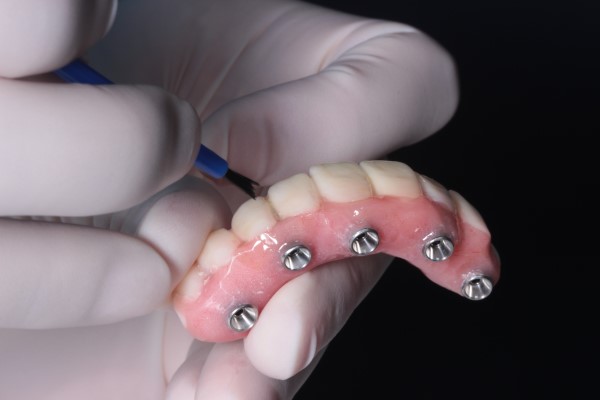Adjusting to New Dentures: The Best Methods for Your New Smile

If you have recently replaced a mouthful of teeth, you are probably adjusting to new dentures. Although dentures greatly improve your smile, this does not mean you immediately become used to wearing them. The good news is there are methods you can use to help adjust, and in about a month, your dentures should start feeling normal.
Methods for adjusting to new dentures
Do not be alarmed if it feels like you have a foreign object in your mouth after you first get dentures. This is normal, and it takes some time to get used to them. This transition process often goes a bit quicker if you follow certain tips.
Manage discomfort
You need to get used to wearing dentures, but your gums and soft tissues in the mouth also must adapt. Immediately after placing the dentures, your dentist will make any necessary adjustments for fit. However, you may still notice some discomfort over the next couple of weeks.
The dentist may recommend that you take the dentures out occasionally to give your gums a break. If sores develop on the gums, rinse with salt water to ease the pain and keep them clean. Over-the-counter pain relievers may also help if you have swelling or discomfort.
As your jaw settles and the gums heal, your dentures will probably require additional adjustments. Your dentist will take care of this as necessary for your comfort and a proper fit.
Train your cheeks
Your cheek muscles assist in talking and eating, and those two tasks become a little easier if you exercise the muscles. You can get a head start by beginning the exercises before you get your new dentures. The process is easy: All you need to do is smile really wide and hold it for about 20 seconds. You should do this four or five times daily.
Practice speaking
When it comes to adjusting to new dentures, speaking can be a challenge. Talking may feel awkward, and certain sounds are sometimes hard to pronounce at first. Make sure you use the right dental adhesive to help to keep the dentures in place.
Practice speaking out loud at home before talking in front of anyone else. It may help to bite down gently and then swallow before speaking. Talking in front of a mirror and singing are also helpful.
Alter your diet
Eating is also difficult at first. In the beginning, select soft foods for meals, such as yogurt, mashed potatoes, soft pasta, mashed bananas, and scrambled eggs, since they are gentle on your gums and help you get used to eating with dentures. You should chew slowly and take small bites. To avoid damaging the dentures, refrain from crunchy, hard, and sticky foods.
Conclusion
Although adjusting to new dentures is not fun, it is worth it to have a new and improved smile. Ease into wearing them and practice the more challenging tasks so you can utilize them with confidence.
Request an appointment here: https://www.providencefamilydentistry.com or call Providence Family Dentistry at (678) 496-7021 for an appointment in our Mableton office.
Check out what others are saying about our dental services on Yelp: Adjusting to New Dentures in Mableton, GA.
Recent Posts
Patients who are adjusting to new dentures may be interested in what types of materials are used to create them. There are several options to choose from when deciding on what kind of dentures to get. A few factors a patient should consider are whether he or she needs partial or full dentures, how long…
Implant supported dentures are dentures that are held in place by implants. They are an effective option for replacing missing teeth. Dental implants are very popular because of their high success rate and advantages. Anyone considering implant supported dentures should take time to learn about the procedure. This includes the recovery process. After the procedure,…
For those who have lost all or most of their teeth, implant supported dentures are the best solution for lifelike, effective teeth replacement. Not only do implant supported dentures feel, look and work better than traditional dentures, but they can also preserve the jawbone underneath, a quality not shared by regular dentures.Although dental implants are better…
Failing to replace a missing tooth can have long-term adverse effects on your dental and overall health. It can change the natural shape of your facial structures and affect your smile's appearance. It can also make you more vulnerable to periodontal disease, which happens to be the top cause of adult tooth loss, according to…


